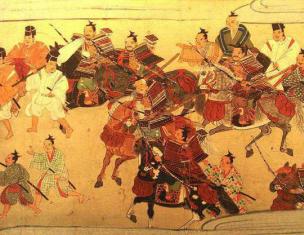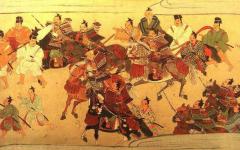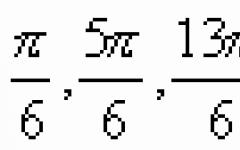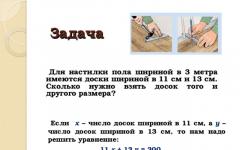The story “The Last Term” by Rasputin was written in 1970. In his book, the author reveals the themes of the spiritual and moral fall of man. The work shows how selfishness, callousness, and heartlessness that have taken over people’s lives and souls affect not only the fate of a particular person, but also society as a whole.
Main characters
Anna- an old woman, mother of five children, a kind, hard-working, caring woman.
Other characters
Varvara- the eldest daughter, a simple village woman, exhausted by a hard life and frequent childbirth.
Lucy– Anna’s daughter, a city resident, educated, demanding of herself and people.
Ilya- middle son, also a resident of the city.
Michael– the youngest son, with whom Anna lives; indecisive, irresponsible, big drinker.
Tatiana- most youngest child Anna, a kind and affectionate woman.
Mironikha- Anna's best friend.
Nadya and Ninka- Anna's daughter-in-law and her little granddaughter.
Chapter 1
The old woman Anna, who was already approaching eighty, “was waiting for death, for which the time seemed ripe.” She held out last bit of strength, but three years ago she “gave up and took ill.”
During her life, Anna gave birth to many children, but “she only had five left alive” - two sons and three daughters. Everything except youngest son Mikhail, left the village, and it was with him that “the old woman lived out her life.” When it became clear that she would depart to another world any day now, Mikhail sent telegrams to his brother and sisters asking them to come.
The first to arrive was the eldest Varvara, followed by the “city people” - Ilya and Lyusya, and everyone was waiting for Tatyana from Kyiv. The mother was very bad, and Varvara began to mourn her while she was still alive, and Lucy sat down to sewing mourning clothes.
Chapters 2-3
Realizing that on payday there would be no vodka in the store, the brothers prudently decided to buy alcohol for their mother’s funeral - at least one box, because “half the village will come.”
Unexpectedly for everyone, Anna opened her eyelids and named the children gathered around her by name. Having learned that Tatyana had not yet arrived, the woman fell into oblivion again.
“Little by little the old woman recovered” and in the evening she asked for liquid semolina porridge. The joy of seeing “her boys did not allow her to rest, it hit her in the face, moved her arms, chest, and clogged her throat.” Anna was very weak, it was difficult for her to speak, and she only looked at the children with love - “greedily, hastily, as if forever absorbing every face.”
While straightening her mother's bed, Lucy noticed that she was sleeping on dirty sheets that had not been washed for a long time. She began to reprimand Mikhail for such indifference, not noticing how deeply Nadya, her brother’s wife, “faced with color.” To which Anna began to defend her daughter-in-law, who had been patiently caring for her all this time. The woman admitted that she had a much harder time with Mikhail when he drank, and he was in this state regularly. Lucy promised to talk to her brother.
To celebrate that his mother had recovered, Ilya and Mikhail decided to have a drink.
Chapters 4-5
The next morning Anna tried to sit up on her own, and she succeeded. At dawn, Ninka, Mikhail’s young daughter, came to her and warmed herself up next to her grandmother.
Anna asked Varvara, who had a bad dream, to run to Mironikha, an old neighbor, and visit her.
Mikhail woke up, having drank three bottles of vodka the other day with Ilya. With a hangover, he was afraid that he and his brother had drunk the entire box, but, looking into the pantry, Mikhail “wrinkled his face happily” - the untouched bottles were still there.
Having prudently hidden one bottle of vodka in the chicken coop, Mikhail woke up his brother, and they began to complain to each other about how difficult it is to deal with a hangover as you get older. However, this did not stop the brothers from drinking a bottle of vodka before breakfast while the women were not seeing them.
Alcohol loosened the tongues of the drinking companions, and they began to lament that the mother did not die in time, when “everyone had gathered and got ready.”
Chapter 7
After some thought, Lucy decided to go for a walk in the forest. She “didn’t want to see anyone, talk to anyone—neither feel sorry nor encourage.” Peering at familiar landscapes, Lucy recalled her carefree childhood and youth - “how strange and how far away it was, as if it wasn’t with her.”
Finally, she reached the field, which was the goal of her walk. Once upon a time when he was hungry post-war period, Lucy was sent to harrow this field, singling out the stallion Igrenka, exhausted by hard work and eternal malnutrition. While working, he unexpectedly fell and was unable to get up. Out of fear, Lucy began to beat the horse, and then ran after her mother.
Having learned about the trouble, Anna immediately rushed to the aid of Igrenka. With gentle persistence, she helped the stallion, who understood her perfectly, to rise. This saved him from certain death.
Walking “through the places that most vividly marked her former village life,” Lyusya clearly realized that she had forgotten a lot, and a lot was gone forever...
Chapters 8-11
Anna was visited by her old friend, the lively and restless Mironikha, who always enjoyed making fun of her neighbor. They savored all the village gossip with pleasure. Looking at Anna, Mironikha thought that “it would be nice for her and the old woman to die at the same hour, so that no one would be left behind for later.”
Mikhail and Ilya went on a deep binge. Soon their neighbor Stepan joined them, and now “Mikhail was no longer afraid of either Satan or his wife.”
Anna was very glad that the children had gathered around her, but her mother’s heart was haunted by thoughts of Tanchora, her youngest daughter Tatyana. She had not seen her for a long time - Tatyana married a military man who was “transferred” from city to city, and soon the couple settled in distant Kyiv.
Tanchora was “the last one, the scratcher” and “grew up more affectionate than her sisters.” At first, Anna was unusual in receiving so much love, so much tenderness from her daughter, and in response, her heart overflowed with gratitude and inexpressible joy.
When Anna realized that there was no point in waiting for Tatiana any longer, “something suddenly snapped in her.” The children tried to calm her down, but the old woman cried without stopping - she was sure that something had happened to Tatyana.
“That same night, without delay,” Anna decided to die. She remembered all her relatives who had passed on to another world, all her children who were never destined to live in this world. Anna believed that she was already delayed, but she had someone to go to. “The old woman died at night”...
Conclusion
In his work, Valentin Rasputin raises the problem of forgetting one’s origins, one’s roots. People, shackled in the shell of their own selfishness and indifference, are losing the rich spiritual heritage of their ancestors.
After familiarizing yourself with a brief retelling“The Deadline”, we recommend reading Rasputin’s story in the full version.
Test on the story
Check your memorization of the summary content with the test:
Retelling rating
Average rating: 4.5. Total ratings received: 226.
Valentin Grigorievich Rasputin. Deadline
Old woman Anna lies motionless, without opening her eyes; it has almost frozen, but life still glimmers. The daughters understand this by raising a piece of a broken mirror to their lips. It fogs up, which means mom is still alive. However, Varvara, one of Anna’s daughters, believes it is possible to mourn, to “voice her back,” which she selflessly does first at the bedside, then at the table, “wherever it’s more convenient.” At this time, my daughter Lucy is sewing a funeral dress tailored in the city. The sewing machine chirps to the rhythm of Varvara’s sobs.
Anna is the mother of five children, two of her sons died, the first, born one for God, the other for the soar. Varvara came to say goodbye to her mother from the regional center, Lyusya and Ilya from nearby provincial towns.
Anna can't wait for Tanya from distant Kyiv. And next to her in the village was always her son Mikhail, along with his wife and daughter. Having gathered around the old woman on the morning of the next day after her arrival, the children, seeing their mother revived, do not know how to react to her strange revival.
“Mikhail and Ilya, having brought vodka, now did not know what to do: everything else seemed trivial to them in comparison, they toiled, as if passing through every minute.” Huddled in the barn, they get drunk with almost no snacks, except for the food that Mikhail’s little daughter Ninka carries for them. This causes legitimate female anger, but the first glasses of vodka give men a feeling of genuine celebration. After all, the mother is alive. Ignoring the girl collecting empty and unfinished bottles, they no longer understand what thought they want to drown out this time, maybe it’s fear. “The fear from the knowledge that the mother is about to die is not like all the previous fears that befall them in life, because this fear is the most terrible, it comes from death... It seemed that death had already noticed them all in the face and would no longer will forget."
Having gotten thoroughly drunk and feeling the next day “as if they had been put through a meat grinder,” Mikhail and Ilya are thoroughly hungover the next day. “How can you not drink? - says Mikhail. - Day, two, even a week - it’s still possible. What if you don’t drink at all until your death? Just think, there is nothing ahead. It's all the same thing. There are so many ropes that hold us both at work and at home that we can’t groan, there’s so much you should have done and didn’t do, you should, should, should, should, and the further you go, the more you should - let it all go to waste. And he drank, as soon as he was released, he did everything that was necessary. And what he didn’t do, he shouldn’t have done, and he did the right thing in what he didn’t do.” This does not mean that Mikhail and Ilya do not know how to work and have never known any other joy than from drunkenness. In the village where they once all lived together, it happened general work- “friendly, avid, loud, with a discordant voice of saws and axes, with the desperate hooting of fallen timber, echoing in the soul with enthusiastic anxiety with the obligatory banter with each other. Such work happens once during the firewood harvesting season - in the spring, so that the yellow pine logs with thin silky skin, pleasant to the eye, have time to dry over the summer, are placed in neat woodpiles.” These Sundays are organized for oneself, one family helps another, which is still possible. But the collective farm in the village is falling apart, people are leaving for the city, there is no one to feed and raise livestock.
Remembering her former life, townswoman Lyusya with great warmth and joy imagines her beloved horse Igrenka, on which “slam a mosquito, and it will fall down,” which in the end happened: the horse died. Igren carried a lot, but couldn’t handle it. Wandering around the village through the fields and arable land, Lucy realizes that she does not choose where to go, that she is being guided by some outsider who lives in these places and professes her power. ...It seemed that life had returned back, because she, Lucy, had forgotten something here, had lost something very valuable and necessary for her, without which she could not...
While the children drink and indulge in memories, the old woman Anna, having eaten the children's semolina porridge specially cooked for her, cheers up even more and goes out onto the porch. She is visited by her long-awaited friend Mironikha. “Ochi-mochi! Are you, old lady, alive? - says Mironikha. “Why doesn’t death take you?.. I’m going to her funeral, I think she was kind enough to console me, but she’s still a tut.”
Anna grieves that among the children gathered at her bedside there is no Tatyana, Tanchora, as she calls her. Tanchora was not like any of the sisters. She stood, as it were, between them with her special character, soft and joyful, human. Without waiting for her daughter, the old woman decides to die. “She had nothing more to do in this world and there was no point in postponing death. While the guys are here, let them bury them, carry them out as is customary among people, so that they don’t have to return to this concern another time. Then, you see, Tanchora will come too... The old woman thought about death many times and knew it as herself. For recent years they became friends, the old woman often talked to her, and death, sitting somewhere on the side, listened to her reasonable whisper and sighed knowingly. They agreed that the old woman would go away at night, first fall asleep, like all people, so as not to frighten death with her open eyes, then she would quietly snuggle, take her short worldly sleep away and give her eternal peace.” This is how it all turns out.
References
To prepare this work, materials from the site http://briefly.ru/ were used
Deadline
Old woman Anna lies motionless, without opening her eyes; it has almost frozen, but life still glimmers. The daughters understand this by raising a piece of a broken mirror to their lips. It fogs up, which means mom is still alive. However, Varvara, one of Anna’s daughters, believes it is possible to mourn, “to echo her,” which she selflessly does first at the bedside, then at the table, “wherever it is more convenient.” At this time, my daughter Lucy is sewing a funeral dress tailored in the city. The sewing machine chirps to the rhythm of Varvara’s sobs.
Anna is the mother of five children, two of her sons died, the first, born one for God, the other for the soar. Varvara came to say goodbye to her mother from the regional center, Lyusya and Ilya from nearby provincial towns.
Anna can't wait for Tanya from distant Kyiv. And next to her in the village was always her son Mikhail, along with his wife and daughter. Having gathered around the old woman on the morning of the next day after her arrival, the children, seeing their mother revived, do not know how to react to her strange revival.
“Mikhail and Ilya, having brought vodka, now did not know what to do: everything else seemed trivial to them in comparison, they toiled, as if passing through every minute.” Huddled in the barn, they get drunk with almost no snacks, except for the food that Mikhail’s little daughter Ninka carries for them. This causes legitimate female anger, but the first glasses of vodka give men a feeling of genuine celebration. After all, the mother is alive. Ignoring the girl collecting empty and unfinished bottles, they no longer understand what thought they want to drown out this time, maybe it’s fear. “The fear from the knowledge that the mother is about to die is not like all the previous fears that befall them in life, because this fear is the most terrible, it comes from death... It seemed that death had already noticed them all in the face and had already won't forget again."
Having gotten thoroughly drunk and feeling the next day as if they had been put through a meat grinder, Mikhail and Ilya are thoroughly hungover the next day. “How can you not drink?” says Mikhail. “Laziness, second, even for a week, it’s still possible. And if you don’t drink at all until your death? Just think, there’s nothing ahead. It’s all the same thing. How many ropes are holding us and at work and at home, you can’t help but groan, you should have done so much and didn’t do it, you should, should, should, should, and the further you go, the more you should - it’s all in vain. I did what I needed to do. And what I didn’t do, I shouldn’t have done, and I did the right thing in what I didn’t do.” This does not mean that Mikhail and Ilya do not know how to work and have never known any other joy than from drunkenness. In the village where they all once lived together, there was a common work - “friendly, inveterate, loud, with a discord of saws and axes, with the desperate hooting of fallen timber, echoing in the soul with enthusiastic anxiety with the obligatory banter with each other. Such work happens. Once during the firewood harvesting season - in the spring, so that they have time to dry over the summer, yellow pine logs with thin silky skin, pleasant to the eye, are placed in neat woodpiles." These Sundays are organized for oneself, one family helps another, which is still possible. But the collective farm in the village is falling apart, people are leaving for the city, there is no one to feed and raise livestock.
Remembering her former life, townswoman Lyusya with great warmth and joy imagines her beloved horse Igrenka, on which “slam a mosquito, and it will fall down,” which is what ultimately happened: the horse died. Igren carried a lot, but couldn’t handle it. Wandering around the village through the fields and arable land, Lucy realizes that she does not choose where to go, that she is being guided by some outsider who lives in these places and professes her power. ...It seemed that life had returned back, because she, Lucy, had forgotten something here, had lost something very valuable and necessary for her, without which she could not...
While the children drink and indulge in memories, the old woman Anna, having eaten the children's semolina porridge specially cooked for her, cheers up even more and goes out onto the porch. She is visited by her long-awaited friend Mironikha. “Oti-moti! Are you, old lady, in any way alive?” says Mironikha. “Why isn’t death taking you?.. I’m going to her wake, I think she was kind enough to give her a treat, but she’s still a fool.”
Anna grieves that among the children gathered at her bedside there is no Tatyana, Tanchora, as she calls her. Tanchora was not like any of the sisters. She stood, as it were, between them with her special character, soft and joyful, human. Without waiting for her daughter, the old woman decides to die. “She had nothing more to do in this world and there was no point in postponing death. While the guys are here, let them bury them, carry them out, as is customary among people, so that they don’t have to return to this concern next time. Then, you see, Tanchora will come too.. The old woman thought about death many times and knew her as herself. In recent years, they became friends, the old woman often talked to her, and death, sitting somewhere on the side, listened to her reasonable whisper and sighed knowingly. They agreed that the old woman would leave. at night, first she will fall asleep, like all people, so as not to frighten death with her open eyes, then she will quietly snuggle, take away her short worldly sleep and give her eternal peace.” This is how it all turns out.
Puganova Daria
Material for the lesson:
1. Analysis of the work.
2. Presentation.
Download:
Preview:
Deadline
1970
Brief summary of the story.
Old woman Anna lies motionless, without opening her eyes; it has almost frozen, but life still glimmers. The daughters understand this by raising a piece of a broken mirror to their lips. It fogs up, which means mom is still alive. However, Varvara, one of Anna’s daughters, believes it is possible to mourn, to “voice her back,” which she selflessly does first at the bedside, then at the table, “wherever it’s more convenient.” At this time, my daughter Lucy is sewing a funeral dress tailored in the city. The sewing machine chirps to the rhythm of Varvara’s sobs.
Anna is the mother of five children, two of her sons died, the first, born one for God, the other for the soar. Varvara came to say goodbye to her mother from the regional center, Lyusya and Ilya from nearby provincial towns.
Anna can't wait for Tanya from distant Kyiv. And next to her in the village was always her son Mikhail, along with his wife and daughter. Having gathered around the old woman on the morning of the next day after her arrival, the children, seeing their mother revived, do not know how to react to her strange revival.
“Mikhail and Ilya, having brought vodka, now did not know what to do: everything else seemed trivial to them in comparison, they toiled, as if passing through every minute.” Huddled in the barn, they get drunk with almost no snacks, except for the food that Mikhail’s little daughter Ninka carries for them. This causes legitimate female anger, but the first glasses of vodka give men a feeling of genuine celebration. After all, the mother is alive. Ignoring the girl collecting empty and unfinished bottles, they no longer understand what thought they want to drown out this time, maybe it’s fear. “The fear from the knowledge that the mother is about to die is not like all the previous fears that befall them in life, because this fear is the most terrible, it comes from death... It seemed that death had already noticed them all in the face and would no longer will forget."
Having gotten thoroughly drunk and feeling the next day “as if they had been put through a meat grinder,” Mikhail and Ilya are thoroughly hungover the next day. “How can you not drink? - says Mikhail. - Day, two, even a week - it’s still possible. What if you don’t drink at all until your death? Just think, there is nothing ahead. It's all the same thing. There are so many ropes that hold us both at work and at home that we can’t groan, so much you should have done and didn’t do, you should, should, should, should, and the further you go, the more you should - let it all go to waste. And he drank, as soon as he was released, he did everything that was necessary. And what he didn’t do, he shouldn’t have done, and he did the right thing in what he didn’t do.” This does not mean that Mikhail and Ilya do not know how to work and have never known any other joy than from drunkenness. In the village where they all once lived together, there was a common work - “friendly, inveterate, loud, with a discord of saws and axes, with the desperate hooting of fallen timber, echoing in the soul with enthusiastic anxiety with the obligatory banter with each other. Such work happens once during the firewood harvesting season - in the spring, so that the yellow pine logs with thin silky skin, pleasant to the eye, have time to dry over the summer, are placed in neat woodpiles.” These Sundays are organized for oneself, one family helps another, which is still possible. But the collective farm in the village is falling apart, people are leaving for the city, there is no one to feed and raise livestock.
Remembering her former life, townswoman Lyusya with great warmth and joy imagines her beloved horse Igrenka, on which “slam a mosquito, and it will fall down,” which in the end happened: the horse died. Igren carried a lot, but couldn’t handle it. Wandering around the village through the fields and arable land, Lucy realizes that she does not choose where to go, that she is being guided by some outsider who lives in these places and professes her power. ...It seemed that life had returned back, because she, Lucy, had forgotten something here, had lost something very valuable and necessary for her, without which she could not...
While the children drink and indulge in memories, the old woman Anna, having eaten the children's semolina porridge specially cooked for her, cheers up even more and goes out onto the porch. She is visited by her long-awaited friend Mironikha. “Ochi-mochi! Are you, old lady, alive? - says Mironikha. “Why doesn’t death take you?.. I’m going to her funeral, I think she was kind enough to console me, but she’s still a tut.”
Anna grieves that among the children gathered at her bedside there is no Tatyana, Tanchora, as she calls her. Tanchora was not like any of the sisters. She stood, as it were, between them with her special character, soft and joyful, human. Without waiting for her daughter, the old woman decides to die. “She had nothing more to do in this world and there was no point in postponing death. While the guys are here, let them bury them, carry them out as is customary among people, so that they don’t have to return to this concern another time. Then, you see, Tanchora will come too... The old woman thought about death many times and knew it as herself. In recent years they had become friends, the old woman often talked to her, and Death, sitting somewhere on the sidelines, listened to her reasonable whisper and sighed knowingly. They agreed that the old woman would go away at night, first fall asleep, like all people, so as not to frighten death with her open eyes, then she would quietly snuggle, take her short worldly sleep away and give her eternal peace.” This is how it all turns out.
Analysis of the story “The Deadline”.
The plot of the work is simple: the old woman Anna is dying, she is waiting for the arrival of her children. She has 5 children in total, only her son Mikhail lives with her mother, her eldest daughter Varvara lives in the regional city, Lyusya and Ilya live in the regional city, her youngest daughter Tanya lives far away. Old Anna is an ideal hero of a passing national character, she experienced: war, her husband’s grievances, raising children, but managed to preserve her soul: “No one will be you instead of you.” She does not envy anyone, she believes that everyone has their own share of grief and joy, and she dies because she has lived out her share of life. He is not afraid of death, but perceives it as part of fate and life: “once I was a blade of grass, but will become a flower.” She hears the gospel.
In this work, the author poses the problem of generations. Children have become different, this can be seen in their attitude towards death: they cannot take death for granted, the anticipation of death is occupied with rituals. Varvara teaches crying, Lyusya sews a black dress, and the sons drink a box of vodka in the bathhouse; they do not feel the scale of the losses. On the first day, an illusion of the clan was created in the house, on the second the children felt guilty and their memory began to awaken, nature reminded them of childhood, on the third day the clan broke up, everyone left. When everyone has left the house, the mother dies, we can say that she dies alone and abandoned by everyone, such is the memory and gratitude of the children. The old woman considers herself to blame for the fact that the children grew up differently. They have become envious, strive for material accumulation, have become detached from the earth, cut off from their roots. Old woman Anna does not like the city; she believes that a woman is a state creature. She looks to see if she is like others, but the woman can see that she had a mother and grandmother. Many Russian writers addressed the problem of continuity of generations, for example: I. S. Turgenev in the novel “Fathers and Sons.” In my opinion, the work is still relevant today, since children should always remember and respect their parents, their home, and remember their roots.
- Category: Summary
Tale (1970)
Old woman Anna lies motionless, without opening her eyes; it has almost frozen, but life still glimmers. The daughters understand this by raising a piece of a broken mirror to their lips. It fogs up, which means mom is still alive. However, Varvara, one of Anna’s daughters, believes it is possible to mourn, to “voice her back,” which she selflessly does first at the bedside, then at the table, “wherever it’s more convenient.” At this time, my daughter Lucy is sewing a funeral dress tailored in the city. The sewing machine chirps to the rhythm of Varvara’s sobs.
Anna is the mother of five children, two of her sons died, the first, born one for God, the other for the soar. Varvara came to say goodbye to her mother from the regional center, Lyusya and Ilya from nearby provincial towns.
Anna can't wait for Tanya from distant Kyiv. And next to her in the village was always her son Mikhail, along with his wife and daughter. Having gathered around the old woman on the morning of the next day after her arrival, the children, seeing their mother revived, do not know how to react to her strange revival.
“Mikhail and Ilya, having brought vodka, now did not know what to do: everything else seemed trivial to them in comparison, they toiled, as if passing through every minute.” Huddled in the barn, they get drunk with almost no snacks, except for the food that Mikhail’s little daughter Ninka carries for them. This causes legitimate female gays, but the first shots of vodka give the men a feeling of genuine celebration. After all, the mother is alive. Ignoring the girl collecting empty and unfinished bottles, they no longer understand what thought they want to drown out this time, maybe it’s fear. “The fear from the knowledge that the mother is about to die is not like all the previous fears that befall them in life, because this fear is the most terrible, it comes from death... It seemed that death had already noticed them all in the face and would no longer will forget."
Having gotten thoroughly drunk and feeling the next day “as if they had been put through a meat grinder,” Mikhail and Ilya are thoroughly hungover the next day. “How can you not drink? - says Mikhail. - Laziness, second, even if it’s a week, it’s still possible. What if you don’t drink at all until your death? Just think, there is nothing ahead. It's all the same thing. There are so many ropes that hold us both at work and at home that we can’t groan, there’s so much you should have done and didn’t do, you should, should, should, should, and the further you go, the more you should - let it all go to waste. And he drank, as soon as he was released, he did everything that was necessary. And what he didn’t do, he shouldn’t have done, and he did the right thing in what he didn’t do.” This does not mean that Mikhail and Ilya do not know how to work and have never known any other joy than from drunkenness. In the village where they all once lived together, there was a common work - “friendly, inveterate, loud, with a discord of saws and axes, with the desperate hooting of fallen timber, echoing in the soul with enthusiastic anxiety with the obligatory banter with each other. Such work happens once during the firewood harvesting season - in the spring, so that the yellow pine logs with thin silky skin, pleasant to the eye, have time to dry over the summer, are placed in neat woodpiles.” These Sundays are organized for oneself, one family helps another, which is still possible. But the collective farm in the village is falling apart, people are leaving for the city, there is no one to feed and raise livestock.
Remembering her former life, townswoman Lyusya with great warmth and joy imagines her beloved horse Igrenka, on which “slam a mosquito, and it will fall down,” which in the end happened: the horse died. Igren carried a lot, but couldn’t handle it. Wandering around the village through the fields and arable land, Lucy realizes that she does not choose where to go, that she is being guided by some outsider who lives in these places and professes her power... It seemed that life had returned back, because she, Lucy, was here she forgot something, lost something very valuable and necessary for her, without which she cannot...
While the children drink and reminisce, old woman Anna, having eaten the children's semolina porridge specially cooked for her, cheers up even more and goes out onto the porch. Her long-awaited friend Mironikha visits her. “Ochi-mochi! Are you, old lady, alive? - says Mironikha. “Why doesn’t death take you?.. I’m going to her funeral, I think she was kind enough to console me, but she’s still a tut.”
Anna grieves that among the children gathered at her bedside there is no Tatyana, Tanchora, as she calls her. Tanchora was not like any of the sisters. She stood, as it were, between them with her special character, soft and joyful, human. Without waiting for her daughter, the old woman decides to die. “She had nothing more to do in this world and there was no point in postponing death. While the guys are here, let them bury them, carry them out as is customary among people, so that they don’t have to return to this concern another time. Then, you see, Tanchora will come too... The old woman thought about death many times and knew it as herself. In recent years they had become friends, the old woman often talked to her, and Death, sitting somewhere on the side, listened to her reasonable whisper and sighed knowingly. They agreed that the old woman would go away at night, first fall asleep, like all people, so as not to frighten death with her open eyes, then she would quietly snuggle, take her short worldly sleep away and give her eternal peace.” This is how it all turns out.







